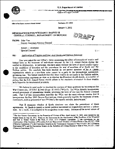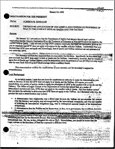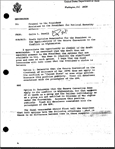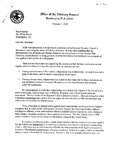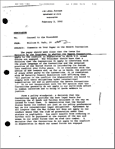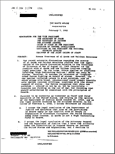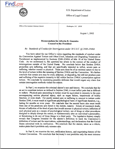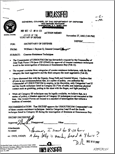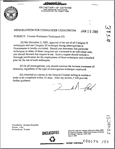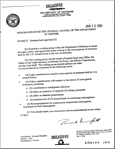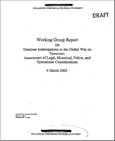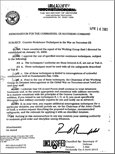
|
Author: John C. Yoo
Title: Deputy Assistant Attorney General |
| Date: Jan. 9, 2002 |
Prepared For: William J. Haynes II
Title: General Counsel, Department of Defense |
| Key Issues: Analyzing whether international law, especially Geneva Conventions and War Crimes Act, apply to al-Qaida and Taliban detainees. |
Key Legal Advice Given:
|
Author: Alberto Gonzales
Title: White House Counsel |
| Date: Jan. 25, 2002 |
Prepared For: George W. Bush
Title: President |
| Key Issues: Responding to concerns of secretary of state and reaffirming earlier advice regarding whether Geneva Conventions apply to al-Qaida and Taliban detainees. |
Key Legal Advice Given:
|
Author: Colin Powell
Title: Secretary of State |
| Date: Jan. 26, 2002 |
Prepared For: Counsel to president
Title: Assistant to President for National Security |
| Key Issues: Responding to draft memorandum on applicability of Geneva Conventions to conflict in Afghanistan. |
Key Legal Advice Given:
|
Author: John Ashcroft
Title: Attorney General |
| Date: Feb. 1, 2002 |
Prepared For: George W. Bush
Title: President |
| Key Issues: On status of detainees as prisoners of war. |
Key Legal Advice Given:
|
Author: William Taft IV
Title: State Department Legal Adviser |
| Date: Feb. 2, 2002 |
| Prepared For: Counsel to the President |
| Key Issues: More warnings against rejecting Geneva Conventions. |
Key Legal Advice Given:
|
Author: George W. Bush
Title: President |
| Date: Feb. 7, 2002 |
| Prepared For: Dick Cheney Title: Vice PresidentColin Powell Title: Secretary of StateDonald Rumsfeld Title: Secretary of DefenseJohn Ashcroft Title: Attorney GeneralChief of Staff to President Director of CIA Assistant to President for National Security Chairman, Joint Chiefs of Staff |
| Key Issues: Whether Geneva Conventions apply to al-Qaida and Taliban detainees. |
Key Legal Advice Given:
|
Author: Jay Bybee
Title: Assistant Attorney General |
| Date: Aug. 1, 2002 |
Prepared For: Alberto Gonzales
Title: White House counsel |
| Key Issues: Standards of conduct for torture under American law (Sections 2340-2340A of Title 18 of the U.S. Code) Defining torture so as to justify gaining maximum information. |
Key Legal Advice Given:
|
Author: William J. Haynes II
Title: General counsel, Department of Defense |
| Date: Nov. 27, 2002 |
Prepared For: Donald Rumsfeld
Title: Secretary of Defense |
| Key Issues: Seeking approval for three counter-resistance techniques to be used in interrogations. |
Key Legal Advice Given:
|
Author: Donald Rumsfeld
Title: Secretary of Defense |
| Date: Dec. 2, 2002 |
Prepared For: William J. Haynes II
Title: General Counsel, Department of Defense |
| Key Issues: Approving Haynes' request, above. |
Key Legal Advice Given:
|
|
|
Author: Donald Rumsfeld Title: Secretary of Defense |
| Date: Jan. 15, 2003 |
| Prepared For: Commander, Southern Command |
| Key Issues: Approved interrogation techniques at Guantanamo Bay. |
Key Legal Advice Given:
|
|
|
Author: Donald Rumsfeld
Title: Secretary of Defense |
| Date: Jan. 15, 2003 |
Prepared For: William J. Haynes II Title: General counsel of Defense Department |
| Key Issues: Detainee interrogations. |
Key Legal Advice Given:
|
| Author: DOD legal task force |
| Date: March 6, 2003 |
Prepared For: Donald Rumsfeld
Title: Secretary of Defense |
Key Issues: Working Group Report on interrogation techniques in war on terror. Allegedly this document was brought by Gen. Geoffrey Miller from Guantanamo to Iraq in 2003 to govern interrogations there as well. |
Key Legal Advice Given:
|
Author: Donald Rumsfeld
Title: Secretary of Defense |
| Date: April. 16, 2003 |
Author: James T. Hill
Title: Commander, U.S. Southern Command |
| Key Issues: Based on Working Group Report above, provides explicit detail on 24 interrogation techniques permitted at Guantanamo Bay. |
Key Legal Advice Given:
|
